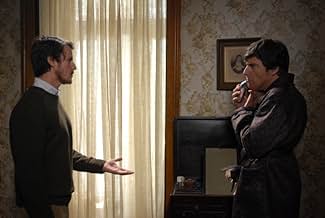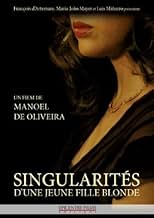IMDb रेटिंग
6.2/10
1.9 हज़ार
आपकी रेटिंग
अपनी भाषा में प्लॉट जोड़ेंA young man falls helplessly in love with a mysterious blonde woman who turns his life upside down.A young man falls helplessly in love with a mysterious blonde woman who turns his life upside down.A young man falls helplessly in love with a mysterious blonde woman who turns his life upside down.
- पुरस्कार
- 3 जीत और कुल 2 नामांकन
फ़ीचर्ड समीक्षाएं
This partly fairytale-like, partly almost surrealist movie is a little gem about gain, loss and regain, about how far one comes in being honest. It is amazing in many respects, as usually with the films of Manoel De Oliveira, and absolutely unique. E.g., the communication between Macário and Luísa takes mostly place between windows. Windows as such are compromises, openings of a wall which separate the inside from the outside, in-between-land that belongs to nowhere. Then the story obviously sets in a noble and stylistically rigid society, possibly in the 19th century, in which the novel had been written. But suddenly you see a computer screen and people paying in Euro. While Ricardo Trêpa, nephew of the director, and Leonor Silveira belong to the director's film-family, Catarina Wallenstein (who has not much to say and nothing special to act) is a true surprise, doubtlessly one of the most beautiful women ever having appeared on the silver screen, yet completely unknown hitherto outside of Portugal.
Is this the first movie by a hundred hear old director and is it any good? Clerk Trêpa working in his uncle's office becomes infatuated with the girl with the fan who he sees in the window opposite the one at which he clerks. He meets and wins her with curious ease but his uncle's unexplained opposition sends him off to Cape Verde where he makes a fortune off screen, that he loses equally easily and he finds his new intended has this alarming flaw - that's an hour and we can go home.
The simplicity of the staging and the glowing interior camera-work do contribute atmosphere but the emphasis is all over the place and the characterisations never connect up.
I'm not a great admirer of the films de Olivera made half a century back so I'm not likely to find this piece more than a curiosity. It has the Old Man Film quality of pieces like Huston's THE DEAD or IMMORTAL STORY without being as good.
The simplicity of the staging and the glowing interior camera-work do contribute atmosphere but the emphasis is all over the place and the characterisations never connect up.
I'm not a great admirer of the films de Olivera made half a century back so I'm not likely to find this piece more than a curiosity. It has the Old Man Film quality of pieces like Huston's THE DEAD or IMMORTAL STORY without being as good.
This measured-paced tale (Singularidades de uma Rapariga Loura) by the Portuguese master, who's now over 100 years old, is from a short story by 19th-century 'realist' Eça de Queiroz. In De Oliveira's treatment, the story gains a surreal feeling and its basic structure makes it seem rather like a fairy-tale or fable. In the frame setting, the protagonist, Macário (Ricardo Trêpa) sits next to an elegant middle-aged lady (Leonor Silveira) on a train to Algarve and tells her he is unhappy and he will tell her why. She says she's all ears and the story begins.
In Lisbon, Macário had an orderly, somewhat pampered existence, living with his uncle Francisco (Diogo Dória) and working as the accountant upstairs above the uncle's attached textile business.
And then one day Macário sees a beautiful blond woman in the window opposite, waving a Chinese fan, and he falls hopelessly in love with her. She is Luisa (Catarina Wallerstein), and she lives with her mother (Júlia Buisel). Macário goes to some trouble to be introduced to Luísa, and is tongue-tied, but she immediately responds and takes him in tow.
Very shortly Macário asks Tio Francisco's permission to marry. But his uncle refuses point blank. Macário says he'll marry anyway. "Then you're fired," Francisco says, "and get out of my house. Now." The hero moves to a tiny room and soon runs out of money, unable to get a job with anyone he knows, because potential employers don't want to displease his uncle. Macário seizes an opportunity to go and work in the Cape Verde islands and comes back with a fortune. Luísa has waited for him, but his generosity to a friend causes him to be duped and he loses his whole Cape Verde nest egg. Though his uncle reverses his positions and asks him back, a desire for independence leads Macário to return to the islands for another lucrative stint. But after all this he ends by discovering Luisa was not worthy of him in the first place.
The film-making here is elegant and beautiful, and the abruptness and cruelty of events call to mind Patrice Chéreau's stunning 19th-century tale 'Gabrielle' (2005) -- which, however, has more emotional power, a richer mise-en-scène, and more three-dimensional characters.
We are clearly in the Old Europe in 'Eccentricities,' with its old-fashioned interiors, spacious, geometrical street scenes and big windows with well-lit views. One particularly lovely shot shows a large mirror with a stairway and rooms behind it, all suffused in a golden light. The simplicity and austerity of the film are enhanced by having no music, except for a harp played at a chamber concert at the home of a wealthy man (a scene again somewhat reminiscent of 'Gabrielle').
The word "eccentricities" is ironic, but the film has its own eccentricities, since the action has a distinct 19th-century quality but prices are in euros and clothes and accoutrements are 21st-century (if not obtrusively so). Also strange is much of the behavior; motivations are never clear. Why does Macário fall in love so fast? Why is he in his uncle's charge? Why does his uncle refuse -- but later reverse himself? Nothing is revealed about Luísa, except for her superficial appeal and coquettish allure. Her perpetual Chinese fan makes her more a symbol or a motif than a real young woman. All of this might make more sense if set more distinctly in the period of the writer, but it is still stylized storytelling rather than Zola-esquire 19th-century realism. What does it mean then to say Eça de Queiroz was a 'realist' writer? Though fascinating for its composure and elegance, the film seems largely a curiosity.
A selection of the 2009 New York Film Festival and seen at Lincoln Center as part of the festival.
In Lisbon, Macário had an orderly, somewhat pampered existence, living with his uncle Francisco (Diogo Dória) and working as the accountant upstairs above the uncle's attached textile business.
And then one day Macário sees a beautiful blond woman in the window opposite, waving a Chinese fan, and he falls hopelessly in love with her. She is Luisa (Catarina Wallerstein), and she lives with her mother (Júlia Buisel). Macário goes to some trouble to be introduced to Luísa, and is tongue-tied, but she immediately responds and takes him in tow.
Very shortly Macário asks Tio Francisco's permission to marry. But his uncle refuses point blank. Macário says he'll marry anyway. "Then you're fired," Francisco says, "and get out of my house. Now." The hero moves to a tiny room and soon runs out of money, unable to get a job with anyone he knows, because potential employers don't want to displease his uncle. Macário seizes an opportunity to go and work in the Cape Verde islands and comes back with a fortune. Luísa has waited for him, but his generosity to a friend causes him to be duped and he loses his whole Cape Verde nest egg. Though his uncle reverses his positions and asks him back, a desire for independence leads Macário to return to the islands for another lucrative stint. But after all this he ends by discovering Luisa was not worthy of him in the first place.
The film-making here is elegant and beautiful, and the abruptness and cruelty of events call to mind Patrice Chéreau's stunning 19th-century tale 'Gabrielle' (2005) -- which, however, has more emotional power, a richer mise-en-scène, and more three-dimensional characters.
We are clearly in the Old Europe in 'Eccentricities,' with its old-fashioned interiors, spacious, geometrical street scenes and big windows with well-lit views. One particularly lovely shot shows a large mirror with a stairway and rooms behind it, all suffused in a golden light. The simplicity and austerity of the film are enhanced by having no music, except for a harp played at a chamber concert at the home of a wealthy man (a scene again somewhat reminiscent of 'Gabrielle').
The word "eccentricities" is ironic, but the film has its own eccentricities, since the action has a distinct 19th-century quality but prices are in euros and clothes and accoutrements are 21st-century (if not obtrusively so). Also strange is much of the behavior; motivations are never clear. Why does Macário fall in love so fast? Why is he in his uncle's charge? Why does his uncle refuse -- but later reverse himself? Nothing is revealed about Luísa, except for her superficial appeal and coquettish allure. Her perpetual Chinese fan makes her more a symbol or a motif than a real young woman. All of this might make more sense if set more distinctly in the period of the writer, but it is still stylized storytelling rather than Zola-esquire 19th-century realism. What does it mean then to say Eça de Queiroz was a 'realist' writer? Though fascinating for its composure and elegance, the film seems largely a curiosity.
A selection of the 2009 New York Film Festival and seen at Lincoln Center as part of the festival.
Singularidades de uma Rapariga Loura is, to the best of my recollection, the first Portuguese film I have seen. It is based upon a work by one of Portugal's greatest writers, Eça de Queirós, who also wrote El crimen del padre Amaro, but that film was done in Mexico.
The film is relatively short, so things happen rapidly. Macário (Ricardo Trêpa) spots a girl (Catarina Wallenstein) in a window, and is smitten instantly. He knows nothing of Luísa, but wants to marry her. Was it the Chinese fan she was holding that stunned him? Uncle Francisco (Diogo Dória) was more level headed and refused to allow it, which sent poor Macário into the streets to earn enough to do it on his own. This is made more difficult by the fact that no one wants to hire him for fear of making his uncle angry. But, he finally finds an employer that immediately sends him to Cape Verde.
Things go well, turn bad, get better, and finally come crashing down.
Oppulent sets and formal mannerisms, as well as humor throughout, make for a very interesting film concerning the moral of not rushing into something before you have all the details.
The film is relatively short, so things happen rapidly. Macário (Ricardo Trêpa) spots a girl (Catarina Wallenstein) in a window, and is smitten instantly. He knows nothing of Luísa, but wants to marry her. Was it the Chinese fan she was holding that stunned him? Uncle Francisco (Diogo Dória) was more level headed and refused to allow it, which sent poor Macário into the streets to earn enough to do it on his own. This is made more difficult by the fact that no one wants to hire him for fear of making his uncle angry. But, he finally finds an employer that immediately sends him to Cape Verde.
Things go well, turn bad, get better, and finally come crashing down.
Oppulent sets and formal mannerisms, as well as humor throughout, make for a very interesting film concerning the moral of not rushing into something before you have all the details.
I am in awe of the director aged over 100 years making such good films. There is indeed something magical about his films--and this one is no different. Windows across a street. People do not call out to the other but only watch each other discretely. There are elegant rooms with candle-lit chandeliers. Possibly the chandeliers are lit with dozens of bulbs that look like candles (or are they real candles)?. There are no sounds of vehicles or electrical switches in camera vision. Yet the décor of the modest cloth shop is 21st century. Euro is the currency and there is a mention of a Portuguese airline, and there is a LED computer screen. The film begins and ends on a modern train compartment. For de Oliveira, time can be switched within the film.
Books, libraries, history, music played indoors to a select audience indicate a sophistication with the matching indoor décor. The conversations are graceful while the story does include mentions of loss of many handkerchiefs from the shop and the stealing of a diamond ring. When the stolen item is paid for, the resulting conversation is most elegant and spoken without raised voices. Add to this, the few Oliveira films I have seen use music only when required. Most contemporary directors cannot conceive such films. That's the magic of the de Oliveira at 100 plus years. The film will be recalled for its style and less for its tale that expects the viewer to suspend belief in logic.
The casting of the main characters is a delight. Ricardo Trepa as Macario, the beautiful Catarina Wallenstein as Luisa, and Leanor Silveira as the middle aged woman on the train. The film reminds you of the décor of Raul Ruiz' "The Mysteries of Lisbon" but that film was not set in the time when Euro was a currency of Portugal.
Books, libraries, history, music played indoors to a select audience indicate a sophistication with the matching indoor décor. The conversations are graceful while the story does include mentions of loss of many handkerchiefs from the shop and the stealing of a diamond ring. When the stolen item is paid for, the resulting conversation is most elegant and spoken without raised voices. Add to this, the few Oliveira films I have seen use music only when required. Most contemporary directors cannot conceive such films. That's the magic of the de Oliveira at 100 plus years. The film will be recalled for its style and less for its tale that expects the viewer to suspend belief in logic.
The casting of the main characters is a delight. Ricardo Trepa as Macario, the beautiful Catarina Wallenstein as Luisa, and Leanor Silveira as the middle aged woman on the train. The film reminds you of the décor of Raul Ruiz' "The Mysteries of Lisbon" but that film was not set in the time when Euro was a currency of Portugal.
क्या आपको पता है
- ट्रिवियाRicardo Trêpa is the director's grandson
टॉप पसंद
रेटिंग देने के लिए साइन-इन करें और वैयक्तिकृत सुझावों के लिए वॉचलिस्ट करें
विवरण
- रिलीज़ की तारीख़
- कंट्री ऑफ़ ओरिजिन
- भाषा
- इस रूप में भी जाना जाता है
- Eccentricities of a Blonde-Haired Girl
- फ़िल्माने की जगहें
- उत्पादन कंपनियां
- IMDbPro पर और कंपनी क्रेडिट देखें
बॉक्स ऑफ़िस
- बजट
- $25,00,000(अनुमानित)
- दुनिया भर में सकल
- $2,17,014
- चलने की अवधि1 घंटा 4 मिनट
- रंग
- ध्वनि मिश्रण
- पक्ष अनुपात
- 1.66 : 1
इस पेज में योगदान दें
किसी बदलाव का सुझाव दें या अनुपलब्ध कॉन्टेंट जोड़ें



























